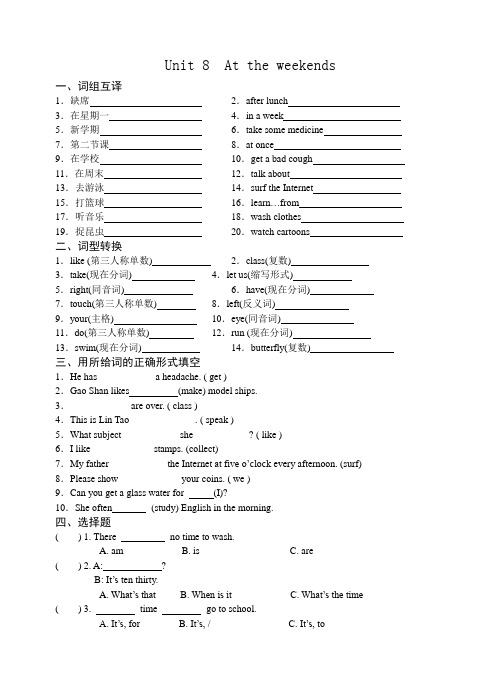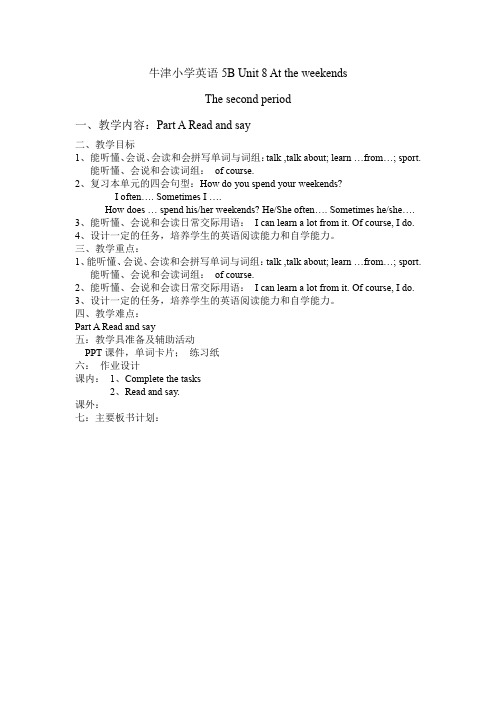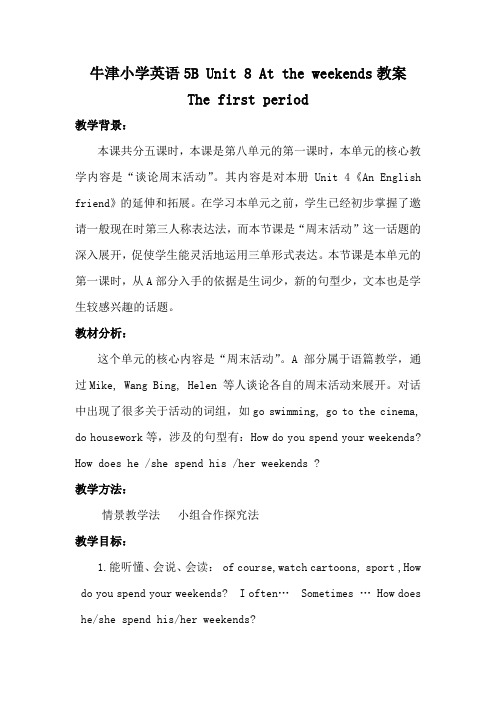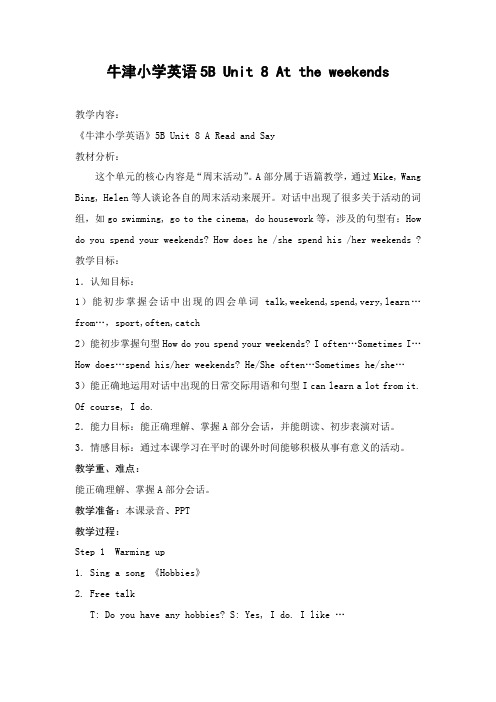牛津小学英语5B Unit 8 At the weekends
- 格式:docx
- 大小:20.44 KB
- 文档页数:5

牛津小学英语5B Unit8 At the weekends市级评优课教案(有配套课件)Unit8 At the weekends 学案课前学习活动一、借助音标或听录音,读准新单词。
(完成情况自评:)talk, talk about, weekend, spend, very, often, learn…from…,sport, catch, of course, cartoon, butterfly二、归纳已学的动词词组。
(完成情况自评:)eg. read books三、借助下列重点讲解,自学C、D部分句型,试着运用以上句型调查朋友或家人的周末。
(完成情况自评:)1.How do you spend your weekends?=(What do you usually do at the weekends?)I often(often=usually) … sometimes I ..2. How does xx/ he/ she spend his/ her weekends?(注意代词的运用)He/ She often …es/s . Sometimes he/ she …es/s(注意动词三单式)3.调查家人或朋友的周末生活。
建议使用以上句型。
课堂学习活动Task1.Watch and circle.看卡通并圈出正确的选项。
1.Wang Bing likes sport / music.2.Helen likes watching TV / swimming .3.Yang Ling likes music / playing on the swingsTask2.Read , number and say. 自由快速读课文,填上序号,并说一说。
NameActivityoftensometimesWang BingMikeYang LingHelenSu Hai & Su YangTry to say:Wang Bing often….s/es…,Sometimes he…s/es….(注意三单式)1.go swimming 2. surf the internet 3. play basketball4. go to the cinema5. listen to music6.go climbing7. do housework 8. go to the park 9. wash the clothes10.clean the rooms 11.watch cartoons 12.catch butterfliesTask3..Read and judge.(T or F)(1) It’s Friday morning. ( )(2) Wang Bing and Mike both(两者都)like sport. ( )(3) Su Yang often watches TV, sometimes she catches butterflies . ( )(4) Helen does housework at weekends. But Yang Ling doesn’t . ( )Task4..Try to retell. 试着用自己的语言复述A部分。

牛津英语5BUnit 8 At the weekends 教案题Unit 8 At the weekends课型新授课时1教学内容B Look, read and learn;C Ask and answer教学目标1能听懂、会说、会读和会拼写单词:ant, butterfly, dragonfllgrabee, cicada, spendweekend2能听懂、会说、会读和会拼写句型:How do you spend your weekends? I often …I ….重点难点1 关于昆虫类的单词的正确朗读和拼写。
2能听懂、会说、会读和会拼写句型:How do you spend your weekends? I often …I ….课前准备教具准备:各种昆虫图片,单词卡片,录音机和磁带师生互动教学过程教学环节教师活动学生活动AFree talk1 Who’s on duty today?Do you have any hobbies?2 Do you like …?What do you usually do on Saturdays/Sundays?I aI do. I like ….Yes, I do.No, I don’t.I usually ….BPresentation and pra出示图片: Look aures.There are maLan ant. Do you like it?Teach:ant同法学习单词:butterfly, dragonflly, grabee2 放录音3 Play a game.展示图片的一个角,让学生猜猜是什么昆虫。
跟读,齐读。
跟读并拼读。
跟读并拼读。
听录音,模仿读。
CAsk and answer1 How do you spend your weekends?Teach: spend weekends2 (教学生回答)I often ….Teach:逐一出示图片,让学生操练句型Teach: caDo a survey:调查班机学生在周末都干些什么。

Unit 8 At the weekends一、词组互译1.缺席2.after lunch3.在星期一4.in a week5.新学期6.take some medicine7.第二节课8.at once9.在学校10.get a bad cough11.在周末12.talk about13.去游泳14.surf the Internet15.打篮球16.learn…from17.听音乐18.wash clothes19.捉昆虫20.watch cartoons二、词型转换1.like (第三人称单数) 2.class(复数)3.take(现在分词) 4.let us(缩写形式)5.right(同音词) 6.have(现在分词)7.touch(第三人称单数) 8.left(反义词)9.your(主格) 10.eye(同音词)11.do(第三人称单数) 12.run (现在分词)13.swim(现在分词) 14.butterfly(复数)三、用所给词的正确形式填空1.He has ___________ a headache. ( get )2.Gao Shan likes (make) model ships.3.____________ are over. ( class )4.This is Lin Tao _____________. ( speak )5.What subject ___________ she ___________? ( like )6.I like ____________ stamps. (collect)7.My father ___________ the Internet at five o’clock every afternoon. (surf) 8.Please show ____________ your coins. ( we )9.Can you get a glass water for (I)?10.She often (study) English in the morning.四、选择题( ) 1. There no time to wash.A. amB. isC. are( ) 2. A: ?B: It’s t en thirty.A. Wh at’s thatB. When is itC. What’s the time ( ) 3. time go to school.A. It’s, forB. It’s, /C. It’s, to( )4. Jump up down .A. with, ten timesB. and, ten timeC. and, ten times ( ) 5. A: Are you ready dinner? B: Yes.A. onB. toC. for( ) 6. How Mike and Helen spend weekends?A. does, theirB. do, hisC. do, their ( ) 7. A: Does Su Yang watch TV at night? B: Yes, she TV at night.A. watchB. watchesC. watchs ( ) 8. The students can learn a lot the books.A. aboutB. toC. from( ) 9. I like , but I like better.A. climbing, dancingB. climb, danceC. climbs, daces ( ) 10. A: What is your father doing? B: He is talking an old man.A. atB. toC. in五、根据要求写句子1.It’s Sunday. (对画线部分提问)________________________________________________2.I like English. (对画线部分提问)________________________________________________3.We have eight subjects this term. (对画线部分提问)________________________________________________4.I like watching TV at home. (否定句)________________________________________________5.She often goes to the park on Sundays. (对划线部分提问)________________________________________________6.My grand father usually reads magazines at the weekends. (对划线部分提问) 7.My sister often catches insects in the park. (改为否定句)8.There are some butterflies in the bottle. (改为一般疑问句并作肯定回答)9.I listen to music or go to the cinema. (改为一般疑问句)10.My brother likes reading books. (否定句)六、连词成句并翻译成中文1.you, spend, weekend, how, your, do2.weekend, Miss Li, does, how, spend, her3.friends, our, insects, good, are4.about, you, how5.too, she, cartoons, often, watches七、阅读理解Jim’s FamilyIt’s nine o’clock in the evening. The family are at home. Jim’s father is sitting in a chair. He’s watching TV. His mother is standing near the window. She’s giving some food( 喂食) to the bird, Polly. Polly says, “Thanks! Thanks!” Where’s Jim? Oh, he’s behind the door. Kate is looking for him. They are playing games. There is no homework on Sunday evening.根据短文选择正确的答案。
![牛津小学英语5B_Unit8_At_the_weekends(Part_A教学设计)[1]](https://img.taocdn.com/s1/m/aaa5cef6f705cc1755270978.png)
英语课,生活味_____________牛津小学英语5B Unit8 At the weekends(Part A)教学设计一、教学背景:本单元教学内容主要围绕“周末活动”这一主题展开,通过周末活动引出本单元的四会内容,涉及的句型有How do you spend your w eekends ? I often …Sometimes I……. How does she/he spend his/her weekends ? He/She often …Sometimes he/she …。
周末活动这一教学内容,贴近生活实际,学生非常感兴趣,所以教学中教师可以创设比较生动的情景,以便在真实的创设中更有效地帮助学生复习有关动作类的词组,将教学内容与实际生活紧密联系起来,而动词词组的第三人称单数形式是本单元教学的重难点所在,教师可以设计丰富多彩的教学活动和教学形式来帮助学生复习理解与巩固强化。
二、设计理念:《小学英语课程标准》提倡“任务型”的教学设计,主张“听说领先,读写跟上”的原则,要求尽量创设真实或半真实的语言环境,引导学生在情景中学语言,开展多种类型的任务活动,提供给学生合作交流的空间和时间,促使学生为完成任务和同学进行合作,为完成任务进行探究性学习。
立足这一点,我充分利用学生已有的知识和生活经验,创设生活化的真实或半真实情境,引导学生在运用语言中学习语言,穿插听、说、读、写的能力训练,从而达到在学习新的语言知识后创造性地运用语言,真正做到为用而学,在用中学,学了就用,以提高学生的综合运用能力。
三、教学目标:I. 知识目标1.Words and phrases:Four-skill: catch, butterfly, sport, talk about, of course, learn…from…, weekends.Three-skill: spend, cartoons.2.Sentence patterns:Four-skill: (1) How do you spend your weekends?I often….Sometimes I ….(2) How does he/she spend his her weekends?She/He often….Sometimes she/he ….Three-skill: I can learn a lot from it.3. usually, often, sometimes的区别II. 技能目标:1. 学生能够熟练地使用本课时句型进行口语交际。

牛津小学英语5B Unit 8 At the weekends
The second period
一、教学内容:Part A Read and say
二、教学目标
1、能听懂、会说、会读和会拼写单词与词组:talk ,talk about; learn …from…; sport.
能听懂、会说和会读词组:of course.
2、复习本单元的四会句型:How do you spend your weekends?
I often…. Sometimes I ….
How does … spend his/her weekends? He/She often…. Sometimes he/she….
3、能听懂、会说和会读日常交际用语:I can learn a lot from it. Of course, I do.
4、设计一定的任务,培养学生的英语阅读能力和自学能力。
三、教学重点:
1、能听懂、会说、会读和会拼写单词与词组:talk ,talk about; learn …from…; sport.
能听懂、会说和会读词组:of course.
2、能听懂、会说和会读日常交际用语:I can learn a lot from it. Of course, I do.
3、设计一定的任务,培养学生的英语阅读能力和自学能力。
四、教学难点:
Part A Read and say
五:教学具准备及辅助活动
PPT课件,单词卡片;练习纸
六:作业设计
课内:1、Complete the tasks
2、Read and say.
课外:
七:主要板书计划:
教学过程:Step 1 Warm up。

牛津小学英语5B Unit 8 At the weekends教案The first period教学背景:本课共分五课时,本课是第八单元的第一课时,本单元的核心教学内容是“谈论周末活动”。
其内容是对本册Unit 4《An English friend》的延伸和拓展。
在学习本单元之前,学生已经初步掌握了邀请一般现在时第三人称表达法,而本节课是“周末活动”这一话题的深入展开,促使学生能灵活地运用三单形式表达。
本节课是本单元的第一课时,从A部分入手的依据是生词少,新的句型少,文本也是学生较感兴趣的话题。
教材分析:这个单元的核心内容是“周末活动”。
A部分属于语篇教学,通过Mike, Wang Bing, Helen 等人谈论各自的周末活动来展开。
对话中出现了很多关于活动的词组,如go swimming, go to the cinema, do housework等,涉及的句型有:How do you spend your weekends? How does he /she spend his /her weekends ?教学方法:情景教学法小组合作探究法教学目标:1.能听懂、会说、会读: of course,watch cartoons, sport ,How do you spend your weekends? I often… Sometimes … How does he/she spend his/her weekends?2.能熟练地朗读对话,理解对话含义。
教学重点:理解对话含义并能流利地朗读对话。
教学难点:1.单词butterfly的发音以及其复数形式。
2.第一人称到第三人称的转化教学准备:PPT 、卡片、录音机教学过程:Step1:Warm up1.Greeting.2.Free talk.① What day is it today?② How do you feel now?③ What do you usualy do…?④ Do you have any habbies?Step 2: Presentation1.Learn “sport”,“Of course”T: Who can ask me?S: Do you have any hobbies?T: Yes, I do .I like running.S: DO you have any hobbies?T: Yes , I do . I like playing basketball .I like sport. Listen three times.T:Who can read it ?Who can read better?T: Do you like sport?S: Yes ,I do (问一两个学生)T: You can say : Of couse, I do.Teach : Of couse = sure 当然T: Do you like sport/English / your mother / playing /Saturday and Sunday?学生用Of couse , I do. 回答2. Learn “at the weekends ”T: From Monday to Friday ,We called weekday(工作日), Saturday or Sunday, We called it weekend.Teach : weekend 周末在周末 We can say “at the weekends”.T: Today let’s talk about our weekends. (揭题 Unit 8 At the weekends)3. T: First I’ll show you my weekends. On Saturday, I often go shopping,do houswork, I sweep the floor, read books in the study. On Sunday I often surf the Internet, write e—mails and play QQ games. They are very interesting. I can learn a lot fromthem.T: This is my weekends, How about your weekends?You can answer like this: I often … Sometimes I … Give you one minute to prepare.T:What do you often do at the weekends?S: I often …Sometimes I … (师问几个学生)T: What do you often do at the weekends ?In another way we can say :How do you spend your weekends?PPT出示让学生根据给出的单词尝试读spend)师领读句子:How do you spend your weekends? (采用小组读,男女生读的方式操练句型)T: Who can read it ? 生读T: How do you spend your weekends ? 生答4. Work in pairs.从生生对话中问:How does he/she spend his/her weekends?5. (1)Let's Guess.生猜测.(2)What's missing:Teach: watch cartoons6.T: Everyone has his own weekends. How about them? Look, they’re…(学生根据黑板上贴的人物图说)7. T: Next, take out your paper, let’s do “ watch and choose”. (先让学生看练习纸, 边看边做练习)根据学生的回答,教师补充板书.8. Open your books, read after teacher.9. Read this part by yourself. (学生在自读时,教师给出朗读小贴示,教给学生阅读的方法,并出示Read and judge练习,让学生边读边思考。

牛津小学英语5BUnit8《Attheweekends》教案(通用11篇)教案是教师为顺利而有效地开展教学活动,根据课程标准,教学大纲和教科书要求及学生的实际情况,以课时或课题为单位,对教学内容、教学步骤、教学方法等进行的具体设计和安排的一种实用性教学文书。
以下是小编为大家收集的牛津小学英语5BUnit8《Attheweekends》教案(通用11篇),仅供参考,欢迎大家阅读。
牛津小学英语5BUnit8《Attheweekends》教案篇1 牛津英语Unit6AtaPElesson教案Unit 6 At a PE lessn第五课时一、教学内容5B.Unit 6 E,G,H 部分.1.复习人体部位名称,以及体育课上的动作词组, D.E部分2.复习祈使句3.复习现在进行时二、教学目标1.通过复习,要求学生能熟练地掌握本单元所学的有关活动类词汇。
2.能熟练的在情景中运用本单元所学的.句型和日常交际用语。
3 能初步了解字母组合ai和a在单词中的发音。
三、教学重、难点能正确听说读写四会句型“Put…n… Tuch…with… All right.”四、课前准备1.准备录音机和本课唱歌的磁带。
2 准备E部分图片3.课前写好本课的课题5B.Unit6.五、教学过程Step 1 Organizatins.1. GreetingsT: Gd rning/afternn, bs and girls.Ss: Gd rning/afternn, Miss Zhang.2. Let’s sing a sng.学生听录音跟读唱英语歌曲 Tw acets.Step2 Revisin1. Free talT: Wh’s n dut tda Ss: I a.T: What da is it tda Ss: It’s Mnda.T: What subect d u lie Ss: I lie…T: What class are u in Ss: I’ in Class Tw.T: What lessns d u have n Mnda Ss: We have…2. 教师出示人体图片,请学生快速说出人体部位名称3.请同学板演默写人体部位名称单词新课标第一网Step3 L and read1. 教师出示图片,复习单词 a pineapple, a grape, an egg, a head和a uth2. 师生问答:Can u … es, I can. N, I can’t.以及Where’s … It’sin …3. 教师出示图片,指导学生看图,并练习读句子。

优秀教案牛津小学英语5B Unit8 At theweekends教学设计二教学目标:1、知识目标:能正确理解、掌握A部分对话,能熟练朗读并表演对话。
四会如下单词:talk, weekend, spend, very, learn...from, sport, often, catch。
2、技能目标:能正确地运用对话中出现的日常交际用语。
3、情感态度目标:乐于感知并积极尝试使用英语。
三教学重、难点能正确理解、掌握对话内容,并能朗读、表演对话。
四课前准备1、录音机、课文磁带、ppt。
2、板书课题:Unit8 At the weekendsStep1.Warming up1、Greetings2、Free talkWe go to school from…..to…..We don’t go to school….and….We can call Saturday and Sunday ‘weekends’.(板书课题At the weekends)(设计意图:用free talk 自然引入本课课题)Step2.Presentation1、Show some old words and try to read the new words by themselves.tall---talk cat/catch---catch but/fly--- butterflyor---sport end---spend week/end---weekend(设计意图:通过旧词引生词,锻炼学生见词能读的能力。
小组合作,熟练的带不熟练的,会的带不会的。
星星之火,可以燎原。
)2、 Make up some phrases using the words, let the students to read then by themselves.talk about like sports watch cartoonscatch butterflies spend weekend3、 Talk about the weekends(teacher’s weekend/ students’weekends)T: Try to say something about my weekends. Yes. I often surf the Internet. Sometimes I do sports. How about you? How do you spend your weekends? You can ask me: How do you spend your weekends?T: I often surf the Internet. Sometimes I do sports.How about you?How do you spend your weekends?S: I often... Sometimes I...(设计意图:通过谈论自己的周末,自然把学生引入“谈论周末”的主题中来。

牛津小学英语5B Unit 8 At the weekends教学内容:《牛津小学英语》5B Unit 8 A Read and Say教材分析:这个单元的核心内容是“周末活动”。
A部分属于语篇教学,通过Mike, Wang Bing, Helen等人谈论各自的周末活动来展开。
对话中出现了很多关于活动的词组,如go swimming, go to the cinema, do housework等,涉及的句型有:How do you spend your weekends? How does he /she spend his /her weekends ? 教学目标:1.认知目标:1)能初步掌握会话中出现的四会单词talk,weekend,spend,very,learn…from…,sport,often,catch2)能初步掌握句型How do you spend your weekends? I often…Sometimes I…How does…spend his/her weekends? He/She often…Sometimes he/she…3)能正确地运用对话中出现的日常交际用语和句型I can learn a lot from it. Of course, I do.2.能力目标:能正确理解、掌握A部分会话,并能朗读、初步表演对话。
3.情感目标:通过本课学习在平时的课外时间能够积极从事有意义的活动。
教学重、难点:能正确理解、掌握A部分会话。
教学准备:本课录音、PPT教学过程:Step 1 Warming up1.Sing a song 《Hobbies》2.Free talkT: Do you have any hobbies? S: Yes, I do. I like …【设计意图:<hobbies>这首活泼的歌曲既能感染学生,调动学生的情绪,歌词中的动词词组如:take photos grow flowers 又能为新课学习作铺垫,自然导入新课。

小学牛津英语5B Unit8 At the weekends Part A第一课时说课稿仪征市刘集小学马凤娟一、教材分析说课的内容是牛津小学英语5B Unit 8 At the weekends Part A第一课时,这个单元的核心内容是“周末活动”。
Part A涉及的句型有:How do you spend your weekends? How does he/she spend his/her weekends? 这些和Unit 4的句型What does he/she usually do on Sundays? He/She usually …有一定联系。
二、学情分析:通过几年的英语的学习,五年级的学生都积累了一定的英语基础,在加上在第四单元中已经学过句型What does he / she usually do on Sundays ? He /She usually… ,学生对第三人称有一定的认识,也为本单元的学习打下了很好的基础,教师应该利用学过的知识结合各种形式的活动,使学生在情景中自然导入到新知识的学习。
三、教学目标:课程标准强调知识与技能、过程与方法、情感态度与价值观三个角度的有机结合,本着这样的认识,我对本课时设计了如下教学目标:1.情感目标:通过活动,游戏,儿歌等形式让学生在老师创设的氛围中敢于,乐于,善于开口讲英语,积极参与交流。
并通过谈论和交流周末生活,知道怎样度过周末更有意义并体会生活的美好,从而更加热爱和珍惜现在的美好的生活。
2.认知目标:(1)掌握对话中出现的关于昆虫的三会新单词butterfly以及其复数形式butterflies。
(2)掌握对话中出现的词组,如catch butterflies, watch cartoons, at the weekends, learn from等。
(3 )句型:How do you spend your weekends? I often… ,sometimes I … How does he/she spend his/ her weekends?He / She often … , sometimes he / she …(4)能模仿对话的语音语调,理解并熟练的朗读对话,读音准确。
牛津小学英语5B Unit 8 At the weekends一、教学内容Fun with English 5B Part A Read and say of Unit 8二、教学目标1.知识技能与策略能听得懂、会说、会读和会拼写单词和词组talk, weekend, very, learn, from, sport.能听得懂、会说、会读和会写句型How do you spend your weekends? I often…Sometimes…三会句型I can learn a lot from it.2. 情感态度:以活动为途径渗透任务型教学,让学生在玩中学,学中玩。
寓教于乐,激发学生学习兴趣,培养他们合作的意识。
三、教学重点四会单词及句型。
四、教学难点能用正确的语音语调比较流畅地朗读对话,并能在正确掌握对话的基础上运用句型,以“weekends”为话题进行对话交流。
五、课前准备1、教具准备a、多媒体课件b、录音磁带c卡片2、板书准备预先写好课题Unit 8 At the weekends六、教学过程A Warm upSing a song: HobbiesT: Do you have any hobbies? What do you like?S1: I like…S2: I like…T: Can you sing the song Hobbies?Ss sing the song Hobbies.B Revision1. Free talkT:How are you? (用右手和学生打招呼)Ss: Fine, thank you. And you?(学生也做同样的手势)T: Very well. Thank you.T:What day is it today?Ss: Today it is Monday.T: I like fishing. What do you like? Do you have any hobbies?S1: …S2: …让学生主动和老师说英语,培养他们主动开口说话的习惯,从被动的应答中走出来。
2. Review some phrasesShow six pictures, review some phrases.(出示图片,让学生看图复习以前所学的词汇)——go swimming\ play basketball\ go climbing\ go fishing\ play volleyball\ play baseball.T: Look! I’ve prepared some pictures, and I want to ask one of you to say a phrase, and the o3.Look and guess. (学生根据教师的动作说出短语,巩固以前所学的词汇)play the guitar\ play the violin\ watch TV\ play with marbles.T: Now, please according to my action, say a phrase. For example, (教师作弹吉他状)you can say the phrase play the guitar, do you follow me?Look and guess.C Presentation and practice1.T: You knew I like fishing. I usually go fishing on Saturdays and Sundays. What do you usually do on Saturdays and Sundays? (课件出示板书)S1:I usually play with marbles.S2: I usually play basketball.2.T(手指向短语Saturdays and Sundays):Saturdays and Sundays, we can say weekends. Who can tell me what the meaning of the word weekends is?S3: 周末。
Ss readit together: weekend/at the weekends.T: OK. Today we’ll learn a new unit—Unit 8 At the weekends.Ss read.T:(教师走向一个学生) What do you do on Saturdays and Sundays? S: I play football. T: How do you spend your weekends? Oh, you often play football at the weekends. (出示板书)How do you spend your weekends? T: Do you know what the meaning of the sentence How do you spend your weekends?is?4.Practise reading: How do you spend your weekends?I often…a.T teaches reading.(课件出示句子及重音’How do you ‘spend your ‘week’ends?)T: Please pay attention to the sentence stress. Now please follow me. Attention! Before you read, please look at the position of my lips. Clear?b. Have a S read it. Check then read in groups.5.Ask and answer.a. Please ask me.b.Practice.①(T put a picture behind the word often.)T asks and Ss answer.②Show two pictures, have Sspractise in two groups.③Show a picture, have Ss make a dialogue.6.T (show a picture): Look at the man. It’s me. Who can use the sentence we learned and ask meHowI spend my weekends?Ss: Howdo you spend your weekends? T: I often go fishing. Sometimes I play chess. Do you know the meaning of the words often and sometimes ?Practice in big groups.D ConsolidationDo a survey.T: Let’s play a game, OK? (学生很高兴)Let us be a reporter. First please do a survey in groups of four. Are you clear?(学生未理解)T: Don’t worry. Let me play the reporter first. Look! (roll up a book into a pipe) This is my microphone.T: ( ask a boy) Howdo you spend your weekends?S1: …(学生顿时兴奋起来)Have some Ss play the game. (先让学生四人小组练习,然后安排学生进行采访活动。
)E Read and say1.Show the hanging chart.2. (教师出示课文投影片简介课文内容,让学生了解对话的背景)Look. This is Wang Bing. How does he spend his weekends? He likes surfing the Internet.I like surfing the Internet, too. I think it's very interesting. I can learn a lot from it. I can learn English, listen to music, write e-mails to my good friends,etc.on the Internet. What do you think? 教师通过手势、表情引出单词very, learn fromTeach reading.3.Learn sport.Mike likes going swimming. Sometimes he likes playing basketball. He likes sports. Do you know what the meaning of the word sports is?Read.1.Have Ss listen to the tape.2. T asks Yes/No questions. (带着问题——练练听力)a. Is it Friday?b. Are the Ss talking about their weekends?c. Does Wang Bing surf the internet every Saturday and Sunday?d. Does Mike like sports?3. Listen again, then answer the question What does Helen like.3. Listen and repeat.F Homework1.Listen to the tape.2.Read the dialogue in groups of three, then try to act it out.。